Children’s Trust has continued its work to support children and families through local prevention partners who deliver our evidence-based programs across the state. Learn how all of us have adapted to safely providing program services during the global pandemic.
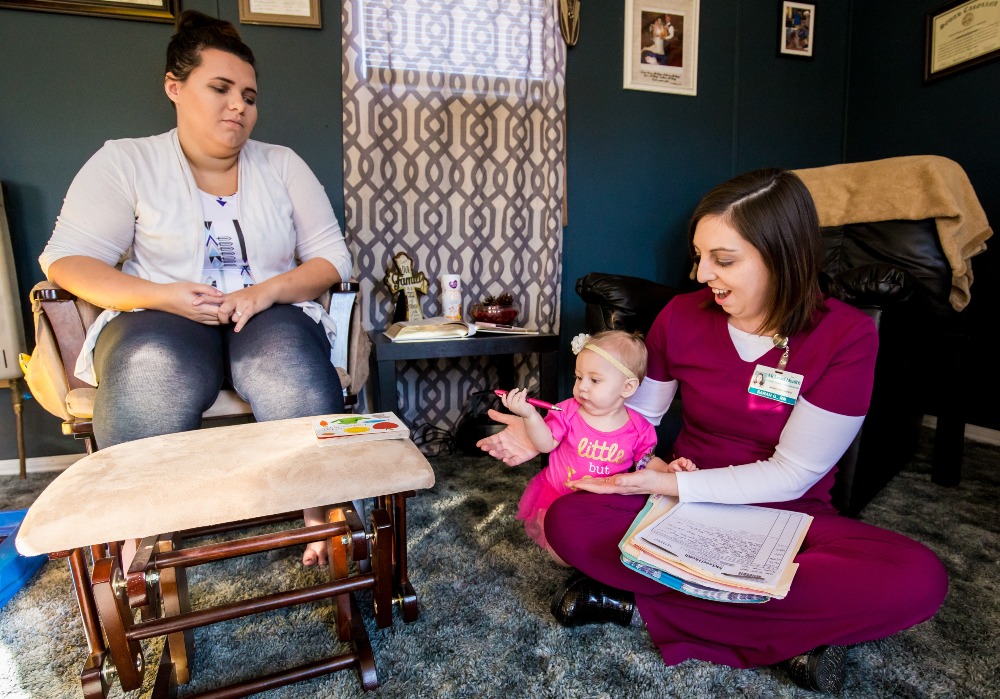
A home visitor from McLeod Nurse-Family Partnership works with a mom and young child in Chesterfield during a 2018 home visit. Services have gone virtual during the COVID-19 health crisis.
The coronavirus outbreak has altered the lives of many people across the globe, and as our country’s federal and state governments have worked to respond medically and economically, one thing is certain. Children and families need more help than ever.
The human toll of this public health crisis likely will not be fully known until the virus is contained and a vaccine is developed, which is why it’s so important for organizations and agencies that serve families to continue their work. As the state’s leader in the prevention of child abuse and neglect, Children’s Trust understands a vulnerable population may be even more at-risk with business closings, school cancellations, stay at home orders, social isolation and food insecurity creating more household stress.
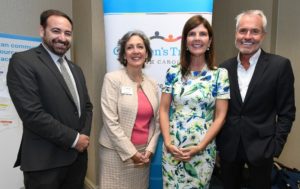
State and national leaders in child abuse prevention came together at the Building Hope for Children Conference hosted by Children’s Trust in 2019.
National experts are saying it’s a recipe for higher rates of abuse, which means Children’s Trust is continuing to work with its 50-plus funded partners across South Carolina to implement prevention efforts such as the Maternal, Infant and Early Childhood Home Visiting (MIECHV) program, the Strengthening Families Program, and Triple P (Positive Parenting Program).
Although our organization’s employees and our partners statewide are working remotely in accordance with social distancing guidelines and stay-at-home orders, they remain committed to helping children and families maintain access to services that are now being delivered in a manner that ensures safety as it relates to the coronavirus.
Children’s Trust CEO Sue Williams thanked our key funding partners at the national and state levels – the U.S. Health Resources and Services Administration (HRSA), the Children’s Bureau federal Community-Based Child Abuse Prevention (CBCAP) grants, The Duke Endowment, S.C. Department of Social Services, Triple P America, Annie E. Casey Foundation’s KIDS COUNT project, and the BlueCross BlueShield of South Carolina Foundation – for continuing to provide support for our wide-ranging prevention work.
Here is an update on how our programs are adjusting to this new reality.
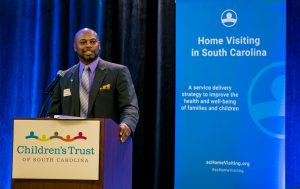
Eric Bellamy speaks at a Home Visiting Summit.
Home Visiting
Of the 16 funded sites delivering a home visiting model through the MIECHV grant, 15 have moved to virtual home visits with one doing a combination that includes in-person for high-need or technology-challenged families. No sites are currently planning to discontinue services at that this time.
Home visitors – who can be nurses, social workers, or child development specialists – support preventive health and prenatal practices, help parents understand developmental milestones, promote the use of positive parenting techniques, and work with mothers to set goals for the future, continue their education, and find employment and child care solutions.
One nurse supervisor with a Lowcountry site that implements the Nurse-Family Partnership model relayed her gratitude for the opportunity to use visual methods such as Skype and FaceTime to connect with clients during this public health crisis. That allows informal parent-child interaction assessments to be done, as well as thorough assessments of both physical and mental/emotional health of the mother and baby. While she notes that nothing will ever replace an in-person visit, virtual visits are the next best thing.
Eric Bellamy, Children’s Trust director of program integration, also noted the National Home Visiting Coalition is asking Congress to consider emergency legislation to meet the needs of families and communities through a one-time appropriation for MIECHV home visitors to reach families in need and allow virtual visits to count as home visits through the end of the calendar year.
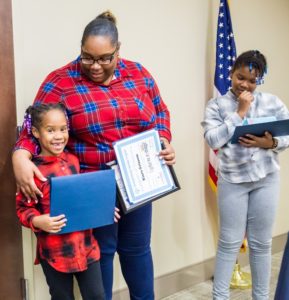
A family graduates from SFP delivered by partner Growing Home Southeast in Columbia in 2019.
Strengthening Families Program (SFP)
SFP had to hit the pause button on its weekly sessions for families at our 31 sites around the state for safety reasons. Currently, all the site coordinators have continued reaching out to families each to week to keep them engaged, calling to check in on them on the day they usually meet.
Sherri Caldwell, Children’s Trust director of community initiatives for SFP, stated the organization is creating a plan that will allow sites to begin virtual engagement. Once a plan is crafted and approved, Caldwell is hopeful sites can start to virtually deliver the program again in early May for those families currently enrolled. This includes weekly family challenges, practicing skills learned in program prior to suspension, and family meetings.
Generally, eight to 12 families gather for each cycle of the 14-week program at a single site. The goal of the program, which is for families with children ages 6 to 11, is to help parents and caregivers improve parenting skills, develop positive discipline practices, stay resilient in tough times, reduce conflict, and assist children with social skills, relationships, and school performance. All these factors play an important role in keeping families strong while protecting against potential child abuse or neglect.
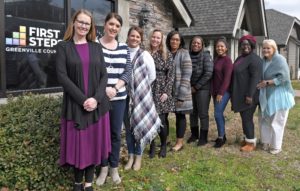
Triple P practitioners gather for a training at Greenville First Steps in 2019.
Triple P (Positive Parenting Program)
Children’s Trust has launched Triple P in Greenville and Georgetown counties, and both sites are working toward helping their local partners adapt to delivering services like conducting virtual seminars for parents, according to Abby Wilson, Children’s Trust director of community initiatives for Triple P. The goal is to have information updated so parents have access to upcoming seminars and information that is useful and supportive during this difficult time.
Greenville First Steps recently developed and led its first coaching session for Triple P practitioners via GoToMeeting, and it also held its first virtual Triple P seminar delivered by a practitioner with Greenville County School District. Triple P Georgetown co-hosted a virtual seminar in early April, the program’s first virtual delivery in the United States, and most likely, internationally. During this time, Triple P Georgetown is continuing to offer virtual coaching sessions to their practitioners as well.
Triple P offers simple, practical strategies to help parents build strong, healthy relationships, confidently manage their children’s behavior, and promote positive childhood development. The partnerships in Greenville and Georgetown will build a countywide, coordinated system of parenting support to meet the needs of families through community-based service organizations, including pediatric practices, libraries, schools and churches, to ensure long-term sustainability.



